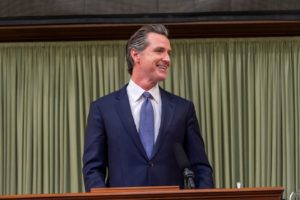Survey finds marriage and faith reap greater social support benefits
Single men aged 30 and older and Americans without religious affiliation have much weaker social support systems that leave them more vulnerable to being alone during sickness or other crisis, a…

Single men aged 30 and older and Americans without religious affiliation have much weaker social support systems that leave them more vulnerable to being alone during sickness or other crisis, a recent survey shows.
The American Enterprise Institute’s (AEI) Survey Center on American Life published the 2024 American Social Capital Survey report of its findings on August 22, noting that Americans’ social lives have been in decline since the mid-20th century, with fewer Americans joining organizations and civic and faith groups that could provide them with social supports.
“Today’s Americans have fewer civic opportunities – that is, places, institutions, groups, programs, and activities in which they can experience community life,” the report notes. “Americans participate in organized activities less often and join fewer community groups than they once did.
“Relatedly, Americans have smaller social networks and fewer friends, and they spend less time with their friends, neighbors, and family members.”
In particular, the survey shows single men aged 30 or older demonstrate “far weaker social support systems” than do older single women, married men, and married women.
The data show that only 41% of single men in this age group say they could ask at least a couple of people to take care of them if they were to become ill. In contrast, 57% of married women, age 30 and up, say they could rely on multiple people to do the same.
“Older single men are also far less likely than older married women to report that multiple people would support them and listen to their problems,” 57% vs. 72%, the report observes.
Overall, the survey results showed that, for Americans under the age of 50 who live alone, 18% say there is no one to offer support to them if they have a problem. In contrast, among those in the same age bracket who do not live alone, only 4% say the same.
For those Americans of age 50 and older, the difference is smaller, with 7% of those who live alone saying they have no one to provide support, in contrast to 2% of those who do not live alone.
Americans who belong to a church or other place of worship are able to identify more people they can rely on for help and support than those without such an affiliation, the survey also finds. Education level, however, is a factor in the degree to which religious affiliation provides social support benefits, with the data showing that among Americans without a formal college education, those with a religious affiliation are much more likely than non-church members to be able to rely on others to take them to a doctor’s appointment (63% vs. 49%), provide them with a place to stay (59% vs. 46%), or help them move (68% vs. 54%).
While less formally educated Americans appear to reap greater social benefits from church membership, college graduates, on the other hand, seem to use many more commercial and public spaces to carry on their social relationships, the survey finds.
These Americans “are more likely than those with a high school degree or less to identify gyms or fitness centers (46% vs. 27%), coffee shops (49% vs. 34%), and bars (43% vs. 28%) as places where they can encounter people in their community,” the report notes, adding the existence of “considerable divisions in civic access across categories of educational attainment.”
“Americans with a high school education or less are twice as likely as those with a college degree to have no access to a civic space (28% vs. 14%),” the survey finds. “More than half (51%) of college graduates have moderate or maximal access to commercial and public spaces, compared to only 35% of Americans without a college education.”
Survey interviews were conducted between March 29 and April 15 among a random sample of 6,597 adults (age 18 and older). All participants were part of the Ipsos KnowledgePanel, a probability-based panel designed to be representative of the U.S. general population.
The margin of sampling error for the qualified survey sample is reported to be +/–1.3 percentage points at the 95% level of confidence.



